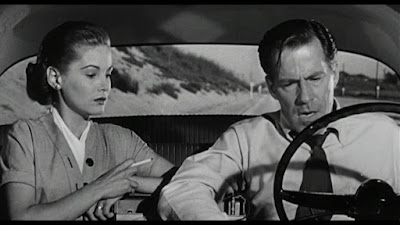The film focuses on Russ Marvin (Hugh Marlowe), a scientist,
and his new wife Carol (Joan Taylor), who spot a flying saucer. Marvin is
coincidentally head of Project Skyhook, a space programme that has already sent
a number of satellites (or ‘birds’) into orbit. However, General Hanley,
Carol’s father, informs him that they have all mysteriously crashed, leading
Marvin to suspect alien intervention. Before long, Skyhook is laid siege to by
the saucers, who proceed to brainwash Hanley, and gain powerful information
about Earth and its inhabitants. The aliens then request to meet Earth’s world
leaders in Washington, while the people of Earth prepare to fight back.
Needless to say, this film is downright ridiculous. I’m
willing to accept that it’s fairly dated now, but the issue is not the effects
themselves. For the most part, they’re outstanding – when it comes to the
saucers themselves at least. The problem is that there is absolutely no
suspense at all – and Russ and Carol, for the majority of the film, don’t seem
the least bit fazed by the presence of the alien ships. Take the opening scene,
for example. A huge saucer flies overhead with little build-up. It simply
appears, making it seem more like a parody than a real sci-fi flick. And the
couple – particularly Carol – evinces little to no emotion. Of course, one must
accept that features such as this were a fairly innovative concept at the time,
but even so, you’d think the presence of an *alien spaceship* and the obvious
destruction of their satellites would incite a greater response than “Come on,
let’s finish our dinner!” In addition, the solution to the problem of the
saucers seems to be simply to blow them to smithereens, which unintentionally
invites you to laugh out loud at its hilariously idealistic conclusion in which
Marvin and his wife are seen casually reminiscing on a beach, grinning from ear
to ear. Oh, those silly aliens.
I’ll admit I’m being a tad harsh here. Contextually, this
film was well-received, mostly due to its visuals, which, I concede, are of an
incredibly high standard. Harryhausen’s stop-motion animation is utilised to
good effect, although by comparison with other efforts, it’s lacking the eerie
detail of his armatured creatures present in a vast array of other monster
media. This, of course, is hardly the fault of a visual effects artist, but a
compromise of budget constraints. According to his online bio, even Harryhausen
himself apparently disliked the conspicuous latex alien suits* and I must
concur that they’re probably the most unconvincing aspect of the movie. In any
case, the remaining visual effects, such as the saucers and the destruction
they wreak upon the world, are no less impactful than they were upon the film’s
initial distribution. The saucers are mystifying enough to maintain the
viewer’s interest, even by today’s standards – even if the script itself falls
flat.
Overall, however, one cannot be too critical. Earth vs. the Flying Saucers is your
quintessential alien flick, and a prototype for a vast quantity of subsequent
features throughout the 20th and 21st centuries. While
the plot isn’t nearly complex enough to compete with today’s films, and its
script is all too ridiculous and overblown to be taken seriously, the visuals
are irrefutably outstanding. While it hardly represents Harryhausen’s most
impressive work, it nonetheless proved to be profoundly influential for years,
and likely will remain so for years to come; a powerful feat.
Image Sources:
Earth vs. the Flying
Saucers. [DVD] (2008) Sony Pictures Home Entertainment.
Other Sources:
Ray Harryhausen. http://www.rayharryhausen.com/biography.php.
Date Accessed: 08/11/2015.







No comments:
Post a Comment